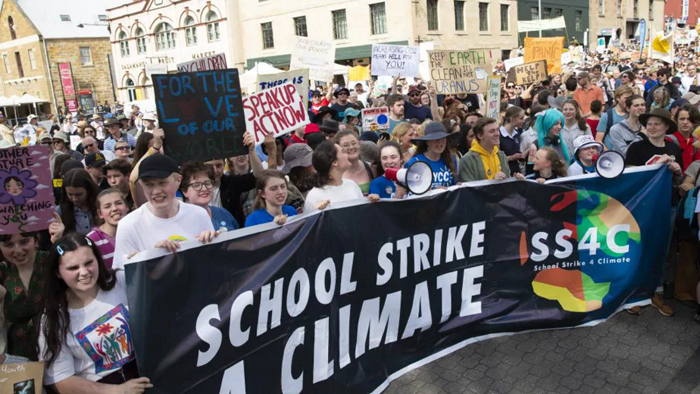Scott Morrison copped a hammering in Tasmanian protests last week, but we also must attend to our own back yard.

The millions of voices on the world’s streets last week were loud, defiant, angry – and mostly young. They will continue to resonate for decades to come, something their countries’ adult leaders would do well to reflect on.
Those leaders who took the stilted view that young people would learn more studying in their classrooms than shouting in the streets completely missed the point of this rebellion: when no-one is listening while the house is burning, you have no choice but to make a big noise.
Placards, chants and speeches in the 100-odd rallies around Australia demanded a ban on new coal mines, fully-renewable energy by 2030 and a just transition for workers and communities. All the anger and frustration was directed squarely at Scott Morrison’s government.
But the backdrop for the Hobart rally was Tasmania’s Parliament House, where Morrison doesn’t hold sway. Will Hodgman and his ministers were notably absent; more to the point they rated barely a mention in the proceedings. But they too have responsibilities in this space.
Last year the government sought the views of Tasmanians on the state’s climate legislation. Given what’s happened over the Act’s 11-year lifetime – the Paris Agreement, some big global science reports and a lot more data on creating a low-carbon economy – it badly needs updating.
Twenty-four submissions were received, most seeking stronger climate mitigation measures. One of the respondents was Climate Tasmania, a group offering scientific, technical, legal and other expertise. I am a non-specialist member of that group.
The Climate Tasmania submission highlighted the unflattering history of Tasmanian climate action since the Act was passed in 2008. Six strategies under five ministers have been written but with no substantial outcome. Each of the first five was shelved with a change of government or minister.
All governments are prone to make dubious claims for credit. In that tradition, the Hodgman government has pronounced itself a world leader in cutting emissions. It hasn’t explained that this “success” is due entirely to a decline in native forest harvesting, or that the most recent data show a rise in emissions across all sectors.
Climate Tasmania’s submission sought much stronger draft legislation than that proposed by the government. It advocated independently reviewed, five-year emission targets, a holistic, whole-of-government approach, and sound, science-based decision-making and risk management.
It put a high priority on equity, community engagement and the concept of a “just transition”. This year it has fleshed this out in drafting instructions for new laws to prepare Tasmania for the shift to a carbon-free economy.
We propose that an energy transition authority be set up to regulate processes and help companies, associations, councils and communities achieve a just transition. It would be expected to work itself out of a job, disbanding when Tasmania no longer uses fossil fuels.
The basis of our concern is that people are making financial decisions right now that will have an impact well into the future. A big one for Tasmanians would be buying a car or some other fossil-fuelled machine which will rapidly lose value in a transition to a low-carbon economy.
Seeking cross-parliamentary cooperation, over the past year or so we have approached all members of the Tasmanian parliament, in both houses and regardless of political ties. We have asked them to hear our concerns about transition planning and discuss how new laws should deal with this.
Some upper house MPs showed early interest, along with opposition leader Rebecca White and other Labor and Green MPs with climate change responsibilities. We also had useful meetings with the speaker, Sue Hickey, and staff of the former environment minister Elise Archer.
This month two of our members met with Peter Gutwein, who in a recent cabinet reshuffle was allocated environment on top of his treasury responsibilities. I wasn’t present, but I was told that the minister had prepared well and gave our proposals a fair hearing, which is good to hear.
Quite reasonably he asked about the cost of what we are proposing. We weren’t able to help – the economic modelling needed for this is way beyond our voluntary organisation’s resources – but this raises a question about how the whole matter of climate change is being handled.
Governments routinely consult specialist expertise in economics, security, defence and such like. But they haven’t made a practice of consulting the experts on global warming, climate scientists, and as a result have little understanding of the risks and imperatives involved.
Our proposal is not without cost, but nothing worthwhile comes free. And a far bigger price is attached to the growing threat that fired up the people in the streets last week. The longer we delay planning, the greater that price will be.
• TOMORROW at 5.30 pm, at the IMAS lecture theatre on Hobart’s Castray Esplanade, David Hamilton of Climate Tasmania will give a public briefing on Tasmania’s transition to a low-carbon economy. All are welcome.
